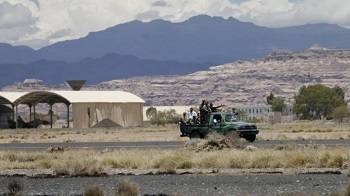Air raids target Houthis after attacks on Saudi town
06/05/2015| IslamWeb
Warplanes have carried out more than 30 strikes on the northwestern Yemeni provinces of Saada and Hajja near the border with Saudi Arabia, local officials and residents said.
The air raids occurred after Yemeni rebels fired rockets and mortars into Saudi Arabia, killing at least two civilians.
Local sources also said there was heavy artillery shelling coming from the Saudi border.
Saudi authorities said that armed Houthi fighters carried out attacks on Tuesday in the town of Najran, forcing authorities to suspend all flights at a local airport, and shut down all schools.
In a statement, Saudi Brigadier-General Ahmed Asiri said that Saudi-led coalition forces would respond to the Houthi attack.
"What happened today is part of the chaos that the Houthi militias live with," he said, adding that "all options are open" to the kingdom to ensure its security.
Yemeni tribal leaders told the Associated Press news agency that armed rebel Houthis, shelled the border area from inside Yemen.
The border area has been a flashpoint for Saudi-Houthi clashes amid a Saudi-led coalition's air campaign targeting the rebels in Yemen.
Relief operations center
News of the latest violence comes as Saudi King Salman announced at a meeting of Gulf leaders the establishment of a center to coordinate relief operations for Yemen, and invited the United Nations to join in the effort.
"We hope that the United Nations will participate effectively with what this center will shoulder, including coordinating all humanitarian and relief works for the Yemeni people with the participation of the countries that are supporting the Gulf initiative," he said in a speech in the Saudi capital.
On Monday, Saudi's foreign minister, Adel-al Jubeir, had said that his country was considering temporary halts in coalition air strikes against the Houthis, to allow for aid deliveries.
For his part, John Kerry, US secretary of state, will visit Riyadh for discussions with Saudi government leaders on May 6 and May 7 to discuss the "humanitarian pause".
The UN has repeatedly warned that impoverished Yemen faces a major humanitarian crisis and calls have been growing for efforts to increase aid deliveries.
The UN has called for a humanitarian pause in the conflict, as relief agencies said they desperately need supplies, including fuel to run infrastructure such as hospitals.
It warned that key infrastructure in the war-torn country, including water supplies, health services and telecommunications, are on the verge of breaking down due to a major fuel shortage.
PHOTO CAPTION
Houthi militants ride on a vehicle on the runway of the international airport of Yemen's capital Sanaa May 5, 2015.
Al-Jazeera

